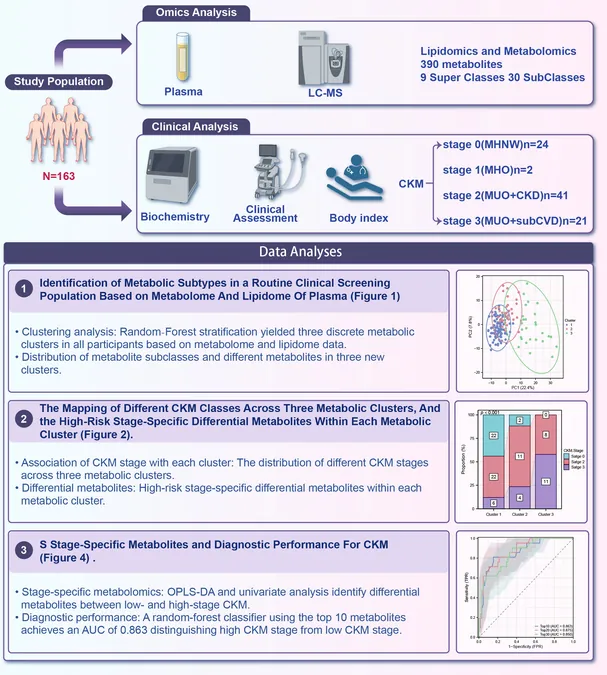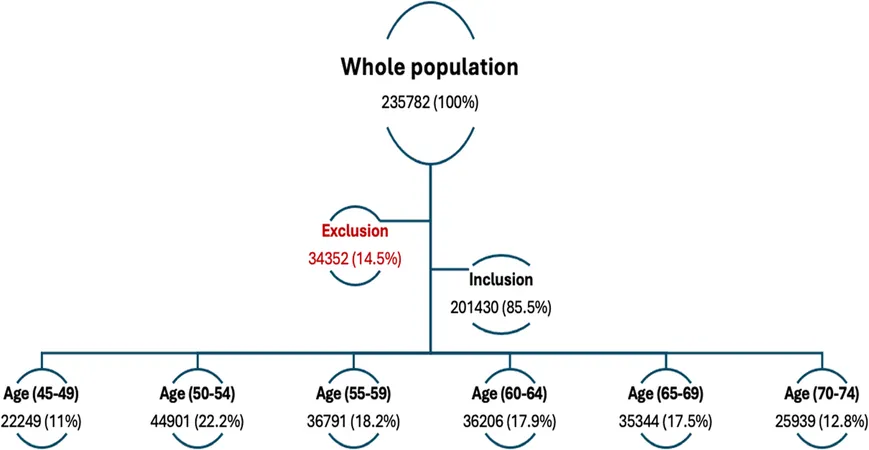
Unlocking Metabolic Mysteries: A Deep Dive into Cardiovascular-Kidney-Metabolic Syndrome Variability
2025-08-01
Author: Yu
Understanding the Study: An Overview
In a groundbreaking research effort, scientists at Shandong Provincial Hospital studied 163 adults aged 18 to 75 to uncover the metabolic variations linked to cardiovascular-kidney-metabolic (CKM) syndrome. Exclusion criteria ensured that only individuals free from active infections, malignancies, and certain medications were included, paving the way for reliable findings.
Gathering Critical Data
Researchers gathered extensive clinical data on participants, including age, sex, and medical history, alongside vital physical measurements like BMI and blood pressure. Advanced techniques like carotid ultrasound helped assess vascular health, while fasting blood tests provided insights into metabolic markers.
Revolutionary Metabolomics: What Does It Reveal?
Utilizing state-of-the-art LC-MS technology, the team conducted untargeted metabolomics and lipidomics profiling. They meticulously processed blood samples to identify unique profiles among participants, uncovering a staggering 390 distinct metabolites that could further illuminate the link between metabolic health and CKM syndrome.
Three Distinct Metabolic Subtypes Revealed
The analysis unveiled three unique metabolomic clusters, each with distinct biochemical characteristics. The first cluster suggested enhanced glycerophospholipid metabolism, while the second indicated heightened fatty acid activity. The third cluster pointed towards alterations in glycosylation pathways, showcasing significant metabolic differentiation.
Metabolic Heterogeneity: Implications for CKM Risk
Diving deeper, researchers mapped CKM risk stages across these clusters, revealing that individuals in the third cluster were more likely to be classified as high-risk. Statistical analyses underscored the necessity of recognizing these metabolic differences in clinical settings.
A Key to Future Diagnostics
The study proposes a revolutionary metabolite panel that could serve as a diagnostic tool for assessing CKM risk. With a promising AUC of 0.875 in distinguishing high-risk individuals, this panel challenges traditional clinical markers, suggesting a paradigm shift in how metabolic diseases might be diagnosed.
Connecting Metabolism to Disease Progression
Highlighting the intricate relationships within CKM syndrome, the research indicates that recognizing both shared and specific metabolic profiles could enhance treatment strategies. The presence of high-risk metabolites across different stages of CKM showcases the need for tailored interventions that address metabolic dysfunction.
Future Directions: A Call for Wider Studies
While the findings are promising, the study acknowledges limitations, particularly its focus on a single cohort. Future research must aim for larger, multi-ethnic studies to verify the results and explore the functional mechanisms underlying these metabolic subtypes. Integrating additional omics layers could enrich our understanding further.
As science advances, the potential for personalized medicine in managing CKM syndrome expands, paving the way for new strategies that could dramatically improve patient outcomes.






 Brasil (PT)
Brasil (PT)
 Canada (EN)
Canada (EN)
 Chile (ES)
Chile (ES)
 Česko (CS)
Česko (CS)
 대한민국 (KO)
대한민국 (KO)
 España (ES)
España (ES)
 France (FR)
France (FR)
 Hong Kong (EN)
Hong Kong (EN)
 Italia (IT)
Italia (IT)
 日本 (JA)
日本 (JA)
 Magyarország (HU)
Magyarország (HU)
 Norge (NO)
Norge (NO)
 Polska (PL)
Polska (PL)
 Schweiz (DE)
Schweiz (DE)
 Singapore (EN)
Singapore (EN)
 Sverige (SV)
Sverige (SV)
 Suomi (FI)
Suomi (FI)
 Türkiye (TR)
Türkiye (TR)
 الإمارات العربية المتحدة (AR)
الإمارات العربية المتحدة (AR)